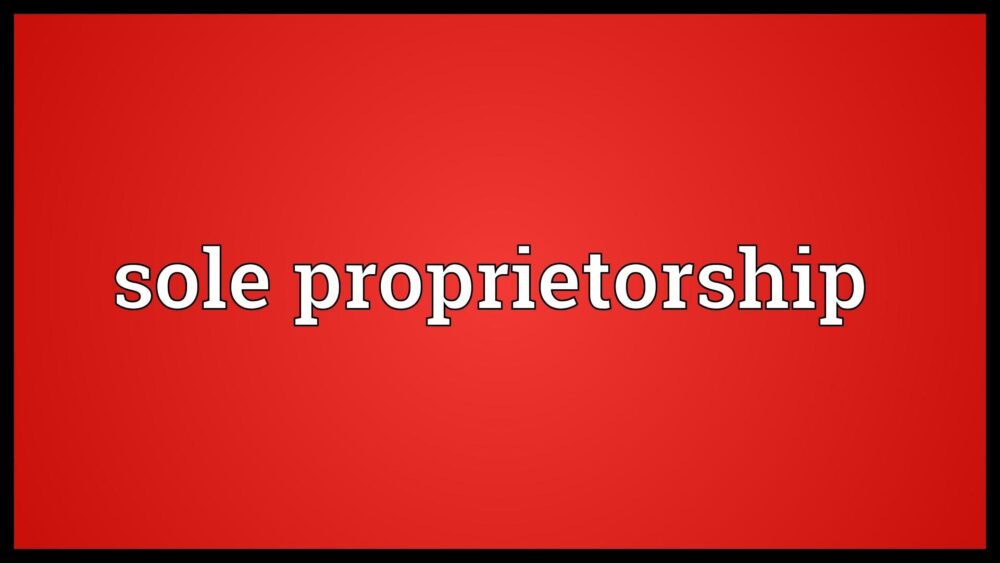A sole proprietorship is an unincorporated business with only one owner who pays personal income tax on business profits.
Due to a lack of government regulation, a sole proprietor is the most straightforward sort of business to start and shut down. As a result, sole owners, independent contractors, and consultants flock to these businesses in droves; because a separate business name isn’t needed, many single proprietors operate on their own identities.
Type of Sole Proprietorship
Type of Sole Proprietorship, If you wish to start your own business, there are several types of fields to choose from.
You are personally responsible for any losses your firm suffers.
When launching a new firm, there are three types of sole proprietorships to consider, each with its characteristics.
Freelancers and self-employed people:
These people might come from any background and operate in any field, and one person runs the vast majority of these businesses. You might locate freelance advisors, authors, or graphic artists who work from home and don’t have much money invested in the company. Many freelancers work on the side while working full-time jobs.
Subcontractors and contract workers:
This category includes a variety of potential enterprises, but when you hear these words, you might think of the construction trades. When it comes to finding work on their own, plumbers, builders, and electricians would match the mold of an independent consultant.
For example, when an independent contractor is employed by a general contractor (GC) to oversee operations on a complicated commercial project, the GC can also hire subcontractors who receive payments.
Franchises:
Although the tax reporting and ownership structure may be the same, a franchisee must often follow a set of rules. That method is represented in the franchisor’s or organization’s operational and marketing plans for names, goods, logos, and other intellectual property. While a franchisee may control management style, they have little to no control over the brand’s appearance, quality, or consistency.
These were the types of sole proprietorship, and we explained them to you in this article.
There have been no differences in how taxes were filed and paid when starting a sole proprietor.
All earnings and expenses are funneled through a personal reporting form.
The same rules apply when you register your single proprietorship with the federal, state, or municipal government. When filing taxes or seeking company funding, you can use your Social Security number unless you apply for an employer identification number (which is not required).
If you’re starting your own business, the range of experiences you’ll encounter will provide essential learning chances in the real world.
To realize the benefits of a sole proprietorship, you won’t need to be an expert on everything. Following Insurance has all of the resources and expert guidance you’ll need to master the basics and rely on us for the finer points regarding insurance planning.
For a complete business insurance consultation, contact Next Insurance today.
Type of Sole Proprietorship

Type of Sole Proprietorship
If you wish to start your own business, there are various fields to choose from.
Trading Business
Many people are familiar with the first type. Because the number of independent enterprises in the trade sector is growing, you can handle yourself with a small or large sum of money.
Dropshipper or reseller
This form of Type of Sole Proprietorship is extensively used today. It can also be done online and profit twice as much. As a result, the process is simple, and you can work from home whenever you choose.
Retailers
This field is appropriate for those who do not have a lot of money. This is accomplished by purchasing numerous things at retail. You don’t have to spend a lot of money because you aren’t buying large amounts.
Type of Sole Proprietorship: Service Business
Because it can adapt to different talents, this field has a lot of fans.
For example, if you enjoy writing, you may start writing service.
Others do not require any funds to establish this form of the individual business. Only supporting things are needed for it to work smoothly.
Of course, service firms are ubiquitous, especially in today’s age of technology and the internet. Whether it’s technical services or something else entirely. Here are some examples of the Type of Sole Proprietorship
Advantages of a Sole Proprietorship

Type of Sole Proprietorship
The benefits of a sole proprietorship are the pass-through tax benefit, ease of formation, and low construction and maintenance costs.
You don’t have to fill out any paperwork with a sole proprietorship, such as state registration. You may need to seek a license or permit depending on your state and type of business. However, less paperwork allows you to get your company up and run faster.
All of your finances can be handled through your checking account.
Disadvantages of a Sole Proprietorship
The downsides of a sole proprietorship include the owner’s unlimited liability outside of the business and the difficulty in acquiring capital investment, mainly through traditional methods like issuing shares and receiving bank loans or lines of credit.
In the end, If you want to start this type of sole proprietorship but are confused about how. Sterling Team may be the best and most reliable option. This group will help with technological business development.
You can try it out by cooperating to make managing your business easier.
This business requires no particular talents; learn how to do it correctly. It might be your primary source of income or a side hustle.
The Type of Sole Proprietorship is a simple way for individuals to form their own company.
Read More: Law firms in Cairo: Optimum importance